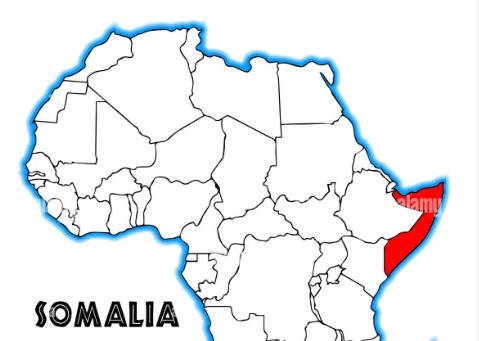By: Modupe Adeniyi. Freelance Health Reporter

Map of Africa showing Somalia in red outline
MONDAY, APRIL 1, 2024: Somalia is grappling with a severe cholera outbreak that has claimed at least 54 lives in recent months, according to humanitarian group Save the Children. The situation has become increasingly dire, with nine deaths occurring within the past week alone, marking the highest weekly death toll this year.
In an interview with VOA Somali, Mohamed Abdulkadir, acting operations director for Save the Children Somalia, highlighted the vulnerability of children to this deadly disease. "In collaboration with Somalia's Ministry of Health and Human Services, Save the Children reveals that among 4,388 confirmed cases in 2024, 59% belong to children under the age of five," Abdulkadir stated.
The southern states of the country including the capital Mogadishu have experienced a significant surge in reported cholera cases over the past two weeks. Abdulkadir reported that 586 new cases have been documented in 23 districts with 331 of them affecting children under the age of five.
The current cholera outbreak which began in January 2024 is believed to be a direct consequence of severe flooding that occurred in October and November 2023. "We believe that the recent devastating flooding in areas like Mogadishu, Beledweyne and Baidoa has contributed to the outbreak of the disease," Abdulkadir explained.
Save the Children is urgently calling for action from local governments and health agencies to combat the rapid spread of cholera. "We call for action from the Somali federal government and the local governments to fight against this highly contagious disease which primarily spreads through contaminated water areas with inadequate sewage treatment," Abdulkadir emphasized.
People who lack safe drinking water are particularly susceptible to the cholera outbreak especially in the wake of flooding. To prevent further transmission of the disease, Save the Children is implementing an emergency response strategy, establishing two cholera treatment centers while providing essential hygiene kits and water treatment supplies in Beledweyne.
Abdulkadir underscored the gravity of the situation, stating that Somalia is at the forefront of the climate crisis. The combination of relentless rainfall, floods and a devastating drought has left children and families extremely vulnerable to illness. He stressed the urgent need for clean drinking water and sanitation facilities to prevent the cholera outbreak from spiraling out of control when the rainy season begins in a month.
In 2023, Somalia recorded more than 18,300 cases of cholera, with 10,000 of those cases affecting children under the age of five. Both Save the Children and the Somali government attributed the devastating rise in numbers to the destructive El Nino flooding in November and December which destroyed toilets and latrines thereby forcing many communities, particularly those recently displaced by flooding and conflict to resort to open defecation.
As the situation in Somalia continues to deteriorate, immediate action and support from the international community are crucial to combat the cholera outbreak and protect the lives of vulnerable children and families.
Source: VOICE OF AMERICA (VOA) NEWS.
Learn more about Cholera in the African setting
Published: March 28, 2024
© 2024. Datelinehealth Africa Inc. All rights reserved.
Permission is given to copy, use and share content for non-commercial purposes without alteration or modification and subject to attribution as to source.
DATELINEHEALTH AFRICA INC., is a digital publisher for informational and educational purposes and does not offer personal medical care and advice. If you have a medical problem needing routine or emergency attention, call your doctor or local emergency services immediately, or visit the nearest emergency room or the nearest hospital. You should consult your professional healthcare provider before starting any nutrition, diet, exercise, fitness, medical or wellness program mentioned or referenced in the DatelinehealthAfrica website. Click here for more disclaimer notice.